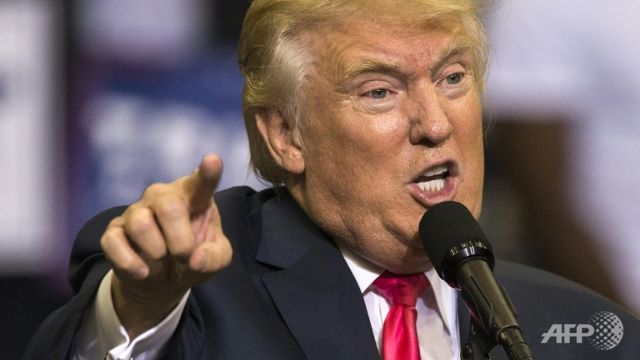Reviving big works projects: Trump's iconoclastic bet
 |
| The Trump team has said it will invest US$550 billion to boost lagging US growth and renovate infrastructure. (Photo: AFP/Mark Wallheiser) |
But while the promised big works program has momentum, the details are fuzzy.
Trump mentioned the infrastructure plan in his first speech after his election victory Nov 8.
"We are going to ... rebuild our highways, bridges, tunnels, airports, schools, hospitals," he said, describing a major works project with Keynesian appeal and very unusual for a Republican.
The Trump team has since said it will invest US$550 billion to boost lagging US growth and renovate infrastructure that has been neglected for too long.
There is little debate on that last point in the United States where the highways are congested, the railway network is aging, and bridges are collapsing.
Several rail disasters - in Philadelphia and Hoboken, New Jersey - the scandal over contaminated water in Flint, Michigan, and the repeated failures of the Metro system in the nation's capital, have highlighted an implacable reality.
Since 1959, infrastructure spending has decreased to 2.4 per cent of gross domestic product from 3 per cent, according to the Congressional Budget Office.
"There's a lot of needs out there and we've deferred maintenance on a lot of these systems for too long," Ed Mortimer, executive director for Transportation Infrastructure at the US Chamber of Commerce, told AFP.
He explained that the saturation of the US road network was hampering trade and complicating the lives of workers.
The American Society of Civil Engineers said the infrastructure "deficit" will cost every household $3,400 a year by 2025, and estimates the total investment needed by 2020 at $3.6 trillion.
Air transport also is a concern. Bemoaning the state of US airports during the campaign, Trump said "we've become a third world country."
FUZZY DETAILS
President Barack Obama for years tried to get approval for spending to improve public transport - also as a means of spurring jobs and economic growth - but he was consistently blocked by congressional Republicans, particularly in the run-up to the elections.
The changing of the guard at the White House could unlock the budget, to the great satisfaction of institutions that insist just such a fiscal stimulus program is needed to make up for the lost potency of monetary policy.
The International Monetary Fund already has labeled Trump's plan as "necessary."
The Democratic leader of the House, Nancy Pelosi, pledged to "work together to quickly pass a robust infrastructure jobs bill" with the Trump administration.
Even business groups, traditionally averse to public spending, look favorably on the proposal.
"This is one of those areas where it's appropriate for the federal government to invest," Matt Sonnesyn, vice president of the Business Roundtable, told AFP. "This is the kind of investment that pays dividends to the economy, that does pay for itself over time."
The question, however, remains: how will Donald Trump finance these major projects?
There are several avenues ranging from public-private partnerships to taxing the profits of multinationals held abroad.
Other politically dangerous solutions would include using toll roads or increasing the federal fuel tax, which has not been altered since 1993.
One thing is certain: federal spending for this program will be more than symbolic, and runs the risk of alienating some Republicans and burdening public finances already jeopardised by the massive tax cuts that Trump also has promised.
"If you have big tax cuts and big increases in military and infrastructure spending then the benefits (to the economy) could evaporate rapidly and the overall effects could turn negative in the longer run," Mark Zandi, chief economist at Moody's Analytics told AFP.
Project selection also will be crucial and must avoid the past practice of funding pet projects to satisfy political allies who want a new road or bridge in their district for their constituents.
"It's hard to get legislation passed that doesn't allocate money broadly, so that everybody gets some regardless of whether it's justified," said Clifford Winston of the Brookings Institute.
"We have to take a much more careful look at the cost and benefits of what we're doing instead of saying that we need to spend more."
What the stars mean:
★ Poor ★ ★ Promising ★★★ Good ★★★★ Very good ★★★★★ Exceptional
Latest News
More News
- Russian President congratulates Vietnamese Party leader during phone talks (January 25, 2026 | 09:58)
- Worldwide congratulations underscore confidence in Vietnam’s 14th Party Congress (January 23, 2026 | 09:02)
- Political parties, organisations, int’l friends send congratulations to 14th National Party Congress (January 22, 2026 | 09:33)
- 14th National Party Congress: Japanese media highlight Vietnam’s growth targets (January 21, 2026 | 09:46)
- 14th National Party Congress: Driving force for Vietnam to continue renewal, innovation, breakthroughs (January 21, 2026 | 09:42)
- Vietnam remains spiritual support for progressive forces: Colombian party leader (January 21, 2026 | 08:00)
- Int'l media provides large coverage of 14th National Party Congress's first working day (January 20, 2026 | 09:09)
- Vietnamese firms win top honours at ASEAN Digital Awards (January 16, 2026 | 16:45)
- ASEAN Digital Ministers' Meeting opens in Hanoi (January 15, 2026 | 15:33)
- ASEAN economies move up the global chip value chain (December 09, 2025 | 13:32)
















 Mobile Version
Mobile Version